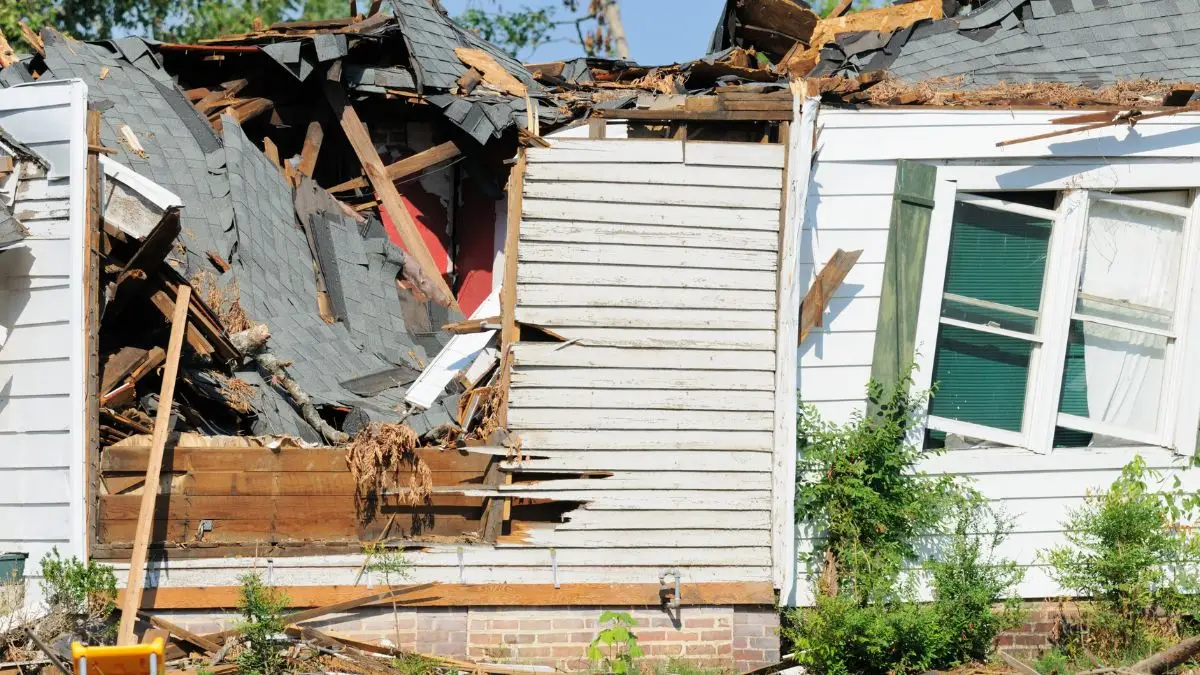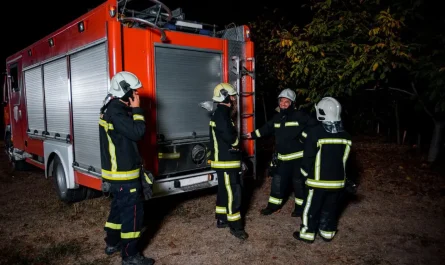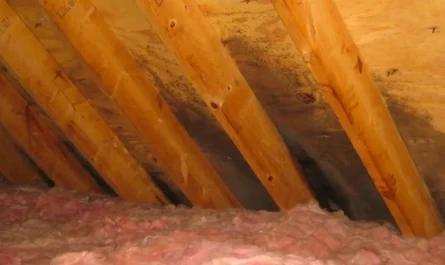Lincoln Home Struck by Lightning, Attic Catches Fire Around Midnight
The horror of discovering smoke in your house when you wake up, especially when it’s completely dark outside and a storm is raging overhead, is beyond me.
That is precisely what occurred on Thursday around 12:20 a.m. in South Lincoln, close to Speidel and San Mateo Lane. A family would be displaced and tens of thousands of dollars would be damaged when lightning struck the middle of a house’s roof during a strong rainstorm that was sweeping through the neighborhood.
Lincoln Fire & Rescue showed up in a flash. Only a little amount of smoke was visible rising from the roof from the outside. However, when they entered, they discovered something that most of us would never have anticipated: a tiny but hazardous fire that was slowly spreading across the attic.
The harm had already started even though the workers extinguished it after fifteen minutes. Rain from the storm was pouring in, the attic was burnt, and the roof was scorched. Fortunately, the homeowners were unharmed, but their evening turned out to be something nobody had planned.
Have you ever been in the vicinity of or during a storm when lightning struck? When inclement weather strikes, what safety measures do you often take?
Inside the Fire: What Lincoln Fire & Rescue Found
One thing caught my attention as I read the report: how quickly everything happened.
Lincoln Fire & Rescue received the call shortly after 12:20 a.m., according to the local report. They arrived at a residence in the center of South Lincoln, close to Speidel and San Mateo Lane. There were no flames pouring out of windows or a raging conflagration when the responders arrived. It was subtly done. The air is just beginning to fill with mild smoke.
That’s what’s frightening. Although you and I frequently believe that fires always appear dramatic, this one didn’t—at least not yet.
After entering the house, firefighters discovered that a minor fire was spreading through the attic. It could have easily become something far worse if it had gone ignored. Timing was almost as important as flames in this situation. This might have turned out quite differently if the family had slept in longer or if assistance had come later.
I wonder if I would even be aware if a fire broke out in my attic while I was asleep.
Even while it first appeared to be under control, a similar attic fire in Indiana earlier this year left a person with minor injuries.
Estimated $50K in Damage Here s What Caused It
This is where things get very bad, both financially and emotionally.
KLIN claims that the fire wasn’t merely started by lightning. When the rain started to pour, it soaked through parts of the house, destroying the attic and tearing apart the roof. That’s where the $50,000 in damage—from the storm itself as well as the flames—really adds up.
Firefighters attempted to protect the interior and tarp the roof, but in a rainstorm, there is only so much they can do.
Consider yourself a member of their family. Fortunately, you’re okay, but your house has a destroyed roof, smoke odors coming from the attic, and your possessions are soaked. While the storm is still overhead, you’re attempting to arrange insurance, get lodging, and salvage as much as you can.
It’s not simply expensive. That is cruel to the emotions.
Have you ever had to cope with a house emergency like this or storm damage? Please share your opinions or anecdotes in the comments section; I’d be interested in knowing how other people responded.
Why Lightning Fires Start in Roofs and Attics?
I had assumed lightning fires were uncommon. However, it turns out that one of the most vulnerable places during a storm could be your attic.
The reason is because when lightning strikes a house, it frequently passes through the tallest, most conductive areas of the building, such as vents, chimney caps, and metal flashing. Here’s where your attic can help. Typically, it is packed with wiring, insulation, and dry wood. Add that to a lightning bolt that is directly carrying more than 30,000 amps. You have the ideal source of ignition.
The majority of attic fires don’t start right away. They are smoldering. And because of this, they are more difficult to spot, particularly at night.
The National Fire Protection Association (NFPA) reports that hundreds of home fires in the United States occur each year as a result of lightning. Even if the number might seem insignificant, families like yours and mine are at serious risk of harm.
Therefore, simply riding out a thunderstorm indoors is insufficient. You must pay attention to what is going on above you.
In order to stay more vigilant in real time without constantly refreshing the news, I have recently been monitoring local fire alarms and safety bulletins via a WhatsApp channel that provides brief updates during storms.
What to Do If Lightning Strikes Your Home?
Storms certainly make you anxious, but not to the point of panic, if you’re anything like me. However, after reading about this fire, my perspective on lightning safety has evolved.
In the event that lightning strikes your house, you should take the following action right away:
-
Get out and call 911
. Even if you don t see flames, don t take chances. Fires can start behind walls or in the attic where you won t see them right away. -
Don t touch metal or plumbing.
Lightning can travel through pipes, wires, and anything conductive. -
Wait for the fire department to clear the house
. You might feel tempted to go back in and check things out, but that s a huge risk. Smoldering fires can reignite.
You never know when your house will be the one. And prevention is fantastic, I promise. What can actually save your life, however, is knowing what to do at that precise moment.
As a reminder that location does not equate to safety, a fire on Tybee Island amid heavy weather sent one person to the hospital.
How to Protect Your Home from Lightning Damage?
To be completely honest, I had never given lightning protection much thought until I witnessed how quickly the South Lincoln fire spread.
My house, like most others, lacks a lightning rod system. However, after witnessing this? Now, I’m reconsidering it.
While researching fire safety advice that both you and I can utilize, I discovered the following:
-
Install a lightning protection system.
That means rods, conductors, and grounding it channels the strike safely into the ground instead of letting it explode through your attic. -
Use surge protectors
everywhere. Not just on your computer. Lightning can fry your TV, fridge, HVAC and yes, even cause a fire if it surges into faulty wiring. -
Get your roof and attic wiring inspected.
Especially if your home s over 10 15 years old. One damaged wire in the attic can turn deadly with a single bolt.
These improvements can lower your insurance premiums in addition to lowering your risk, according to the Insurance Institute for Business & Home Safety.
Therefore, this is not overkill if storms are frequent in your location. It’s simply being astute.
Unfortunately, not all fires have a safe conclusion, as seen by the St. Louis nighttime fire that killed one guy before anyone could arrive.
Insurance and Repairs: What Happens After a Fire
Your entire world is turned upside down after a fire, no matter how minor. As someone who has dealt with home fires in the past, I can attest that the insurance process can be just as stressful as the actual fire.
If you ever encounter something similar, you should take the following action right away:
-
Call your insurance provider right away.
Don t wait. Document everything photos of the roof, attic, water damage, even the tarp. -
Ask about temporary housing assistance.
Most homeowner policies include coverage for hotel stays or short-term rentals if your home is unlivable. -
Be wary of storm chaser contractors
. After an event like this, some shady repair crews roll in offering fast fixes. Always go with licensed, local professionals. -
Request a full inspection
not just roof and attic. Fire and water damage can seep into wiring, drywall, insulation. You need a full picture before rebuilding.
If this were my home, I d want someone to walk me through every single step because let s face it, the stress alone makes it hard to think clearly.
Final Word
If there s one thing I took away from this fire, it s that lightning doesn t care how prepared you feel. It only takes one strike.
The family in South Lincoln did nothing wrong. They were just in the path of nature and thankfully, they got out safe. But $50,000 in damage, a torn-up roof, and a night spent in uncertainty? That s the kind of disruption I don t wish on anyone.
So if you re reading this and thinking, This could never happen to me, I hear you. I used to think the same.
But storms are changing. Weather is getting more unpredictable. And being ready isn t about fear it s about peace of mind.
If you re interested in more real-life home incidents and safety tips, visit our fullHome Incidents section.
Disclaimer:This article is based on publicly available reports and official statements at the time of publishing. Details may evolve as more information is released. Always consult local authorities or professionals for safety and insurance guidance.
Contents Table
-
Inside the Fire: What Lincoln Fire & Rescue Found
-
Estimated $50K in Damage Here s What Caused It
-
Why Lightning Fires Start in Roofs and Attics?
-
What to Do If Lightning Strikes Your Home?
-
How to Protect Your Home from Lightning Damage?
-
Insurance and Repairs: What Happens After a Fire
-
Final Word




